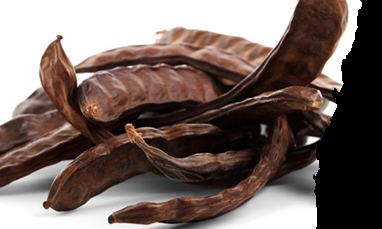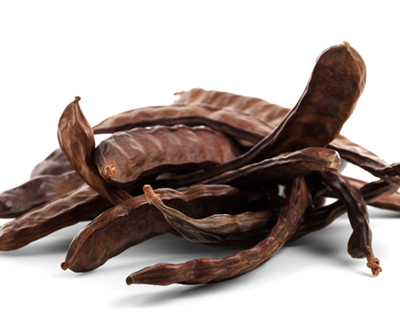Carob exporter or locust bean gum or carubin or algaroba [1] is poorly soluble but viscous dietary fiber extracted from the seeds of the carob tree (Ceratonia siligua, which belongs to legume family) grown in Mediterranean. It is an indigestible carbohydrate, a polysaccharide made of galactose and mannose Carob comes from the carob tree (Ceratonia siliqua) and is a small shrub part of the pea family. The tree produces edible pods, which are actually legumes. When the pods are ripe (which is usually after about 1 year) they can be dried (and sometimes roasted) and ground into carob powder. Unlike cacao, where the beans are extracted from inside the pod, carob is from the dried pod and not from the nuts or seeds.
Export Carob is native to the Mediterranean and is a resilient drought resistant tree which tolerates hot and humid coastal areas. Hence why it grows well in warm temperate and subtropical weather like that in many parts of Europe, Egypt, Turkey and parts of America. The fruit is by nature an organic product, as the trees are usually grown in the wild with the minimum human interference in terms of cultivation practices.The carob tree begins producing about five pounds of pods six to eight years after planting, and continues bearing fruit for 80 to 100 years. By the time the tree is 12 years old it produces approximately 100 pounds of bean pods per year, while older trees produce up to 250 pounds. In September and October the trees blossom and then take a further 11 months to develop thick, flat, green pods
Carob exporter which is also referred to as the carob pod or carob bean, is the fruit of the evergreen carob tree. Each carob pod contains seeds that sit in the pod’s pulp. The pulp is rich in sugars and therefore is naturally sweet and tastes and looks like chocolate. It can be ground into fine powder or used in the form of an extract. The seeds also provide a source of gum.Carob pods must be harvested before the winter rainy season. Canvas sheets are spread on the ground around the trees to collect the fallen pods. Although mechanical harvesting has been utilized recently, the most common method of harvesting is by long hooked poles,
Carob exporter used as a chocolate substitute, as cocoa powder and as a natural sweetener. People who are allergic to chocolate can generally use this herb. It does not contain caffeine and theobromine like chocolate, and it is lower in fat. The powder lowers the glycemic index of foods when it is added, making it a good diet additive. Opera singers once used it to save their voices when performing on a strenuous schedule. The powder is also used in veterinary medicine to relieve diarrhea in livestock. Flour made from the herb is used cosmetically to make an herbal face-pack to tone and cleanse the skin. Carob wood is used to make walking sticks and in marquetry work. Carob exporter is caffeine free and although cacao only contains a small amount of caffeine, it is still a stimulant and in some cases can be allergenic. It is said that the compound theobromine (which stimulates the central nervous system) found in cacao also acts as a stimulant and can be the reason for feeling 'hyper' after eating chocolate or cacao products. Carob is free from theobromine, thenylthylamine and tyramine (commonly found in chocolate) - these are known to trigger headaches and migraines . Carob does not contain o xalic acid, which is known to inhibit calcium absorption . Dogs should not eat cacao or chocolate - dogs are unable to metabolise theobromine, therefore carob is often used as a substitute .
Our carob exporter comes from Italy and is certified organic to guarantee no chemical interference Carob, dried or roasted and having a slightly sweet taste, in powder or chip form, is used as an ingredient in icecreams, cakes and cookies. Carob is sometimes used as a substitute for chocolate. The seeds, also known as locust beans, are used as animal feed. They are also the source of locust bean gum, a thickening agent used in numerous processed foods. In some countries, carobs are consumed as a snack. Crushed pods are used to make a refreshing drink. Compotes and liqueurs are also made from carob. Carob has proven effective in relieving diarrhea in infants. In some sections, a syrup extracted from carob export used as a complement to some dietary supplements.
Carob is a natural food that has a slightly sweet taste resembling chocolate, but unlike chocolate it contains no stimulants and has been found to improve nutrition and digestion. Carob is a good source of fiber and protein, as well as the minerals magnesium, calcium, iron and potassium, and the minerals A, D and B. It contains the polyphenols catechin, gallic acid and quercetin - all powerful antioxidants. Carob exporter contains tannins that work as antioxidants, aiding the digestive tract. Carob tree is native to the Mediterranean lands of Northern Africa, Southern Europe, and the bigger Mediterranean islands; to the Western Asia into Iran; and to Macaronesia (groups of North Atlantic Ocean islands) and Canary Islands.





